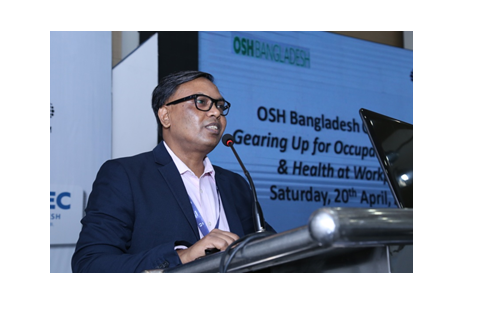|
We spoke to A. K. M. Masum Ul Alam, OSH Expert & Adjunct Faculty, Bangladesh University of Health and Sciences to understand key challenges faced in implementing safety regulations, steps required to get workers to accept and follow safety related norms, the innovative OSH Kit prepared by him and how it has helped spread awareness regarding OSH, his work with various international bodies of repute such as the UN, ILO and DIFE and his views on OSH Bangladesh conference and expo and the role played by it in enhancing OSH awareness.
Interviewed by Adeesh Sharma
From your long experience as a safety expert please tell us the key challenges you have faced in implementing safety regulations?
In Bangladesh We have OSH Policy and OSH Profile. Though OSH Profile was developed in 2002 and OSH Profile in 2013. OSH experts, most of them have no information about the OSH Profile and OSH Policy. Also Bangladesh Labour Law 2006 and Labour Rules 2015 have clear instructions on OSH. OSH National Plan of Action has not yet been developed by the government. It’s really challenging to execute safety regulations in Bangladesh. I found that people who are working in the industries have lack of knowledge on safety regulations. But, these are basic supporting instruments for OSH experts in Bangladesh to execute and ensure compliance to safety in the workplace.
Also sometimes employers are reluctant to execute OSH regulations due to absence of close monitoring by the legislative authority like Department of Inspection for Factories and Establishment (DIFE). DIFE has lack of manpower to monitor around 60,000 formal and informal structures. I must say that lack of expert people to inspect formal and informal structures. Almost most of the workers have no idea about OSH regulations and they are not interested to learn. Rather they are fighting to get regular salary and other financial benefits. Workers consider OSH as second priority. However, OSH situation has been changing. Specially, government, employers and other stakeholders are trying to improve the situation. Bangladesh government has taken the issue seriously. A lot of positive efforts have been taken by the government to overcome the situation. But it would take time to comply with laws and legislation in Bangladesh.
What steps are required to get workers to accept and follow safety related norms?
Workers are the key factor to produce product and maintain quality. Also workers are ultimate sufferers if they do not follow OSH regulations, and as an end result business also suffers. Workers are reluctant to follow OSH norms. Most of them have other priorities. However, there is no alternative. Everyone should follow OSH norms. To increase practice of OSH norms, government, employers and workers must work together. Also there is need to introduce awareness initiatives and compliance with laws and policies. Both areas must work together. Otherwise it will be challenging to accept and follow safety norms in the industry. Despite that private sector has come forward for providing support to the government and employers to educate workers and introduce awareness and training to educate workers to follow OSH norms.
Please tell us about the OSH Kit that you’ve prepared and how it has helped spread awareness regarding OSH.
OSH KIT is the only government-approved document ever in Bangladesh to provide adequate support for employers, workers and stakeholders to create safety workplace in Bangladesh. OSH KIT comprises of 11 types of topics on one pagers and a longer version. It is a guiding tool to implement OSH at the company and the factory level. OSH KIT covers Occupational Safety and Health Policy, Law and Rules, Safety Committee, Risk Assessment and Daily and Weekly Checks, Workplace Accidents, Fire Safety, Electrical Safety, Chemical Management, Emergency Preparedness, Workplace Health and Safety Management, alerts on OSH issues and Personal Protective Equipment.
OSH Kit includes technical guidelines, general; support materials and posters and help tools that can be utilized both for training and general advocacy in and outside factories. OSH KIT is an instrument for the fostering education, knowledge and information. OSH KIT has also introduced most appropriate and sustainable mechanisms for delivering education, training and enforcement in the workplace for functioning Safety Committees effectively and efficiently.
Please tell us about your work with various international bodies of repute such as the UN, ILO and DIFE.
I worked for International Labour Organization, UNICEF international NGOs – Save the Children International, Care International and Danish International Development Agency in the field of Occupational Safety and Health, Risk Assessment, Safety Committee, OSH for Youth, OSH in the RMG sector, Youth and Child Development and in planning, implementing and Project Designing and management of program, Monitoring & Evaluation, Project Proposal Writing, Report Writing and Advocacy. I got the opportunity to contribute to review OSH Profile (Draft) in Bangladesh, contribute to prepare OSH National Plan of Action (Draft). Also, I provided support to establish OSH Unit under DIFE, BEF, BKMEA and BGMEA. Also, I have prepared Safety Committee training manual for DIFE and conducted trainings for mid level managers and supervisors. I developed campaign materials like songs, radio episodes, PSAs etc. I am extremely happy to work on OSH and have contributed to create a safety culture in Bangladesh. Definitely my effort in OSH will be continuing to create safety culture in Bangladesh.
Please share your views on OSH Bangladesh conference and expo and the role played by it in enhancing OSH awareness.
OSH Bangladesh conference and expo has been created a new era on OSH in Bangladesh. Now, it is the only platform for OSH experts in Bangladesh. This is the first time OSH Bangladesh conference and expo took place in Bangladesh. It has supported to bring all experts and service providers under one umbrella. I must appreciate UBM India for taking initiative and support provided to organize the event in Bangladesh. Also expect that this support will be continuing in Bangladesh for boosting up to create Safety Culture in Bangladesh.
| 


